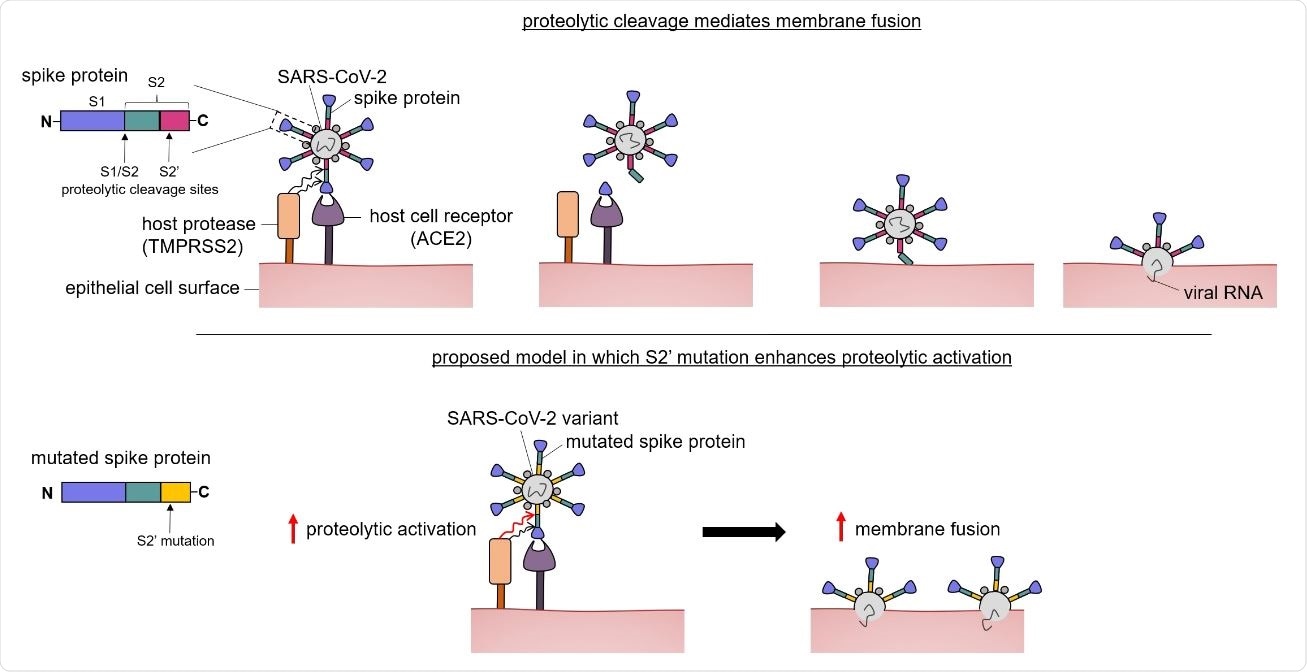A team of scientists from South Korea and the United States has conducted an interesting study to investigate whether mutations in the genome of severe acute respiratory syndrome coronavirus 2 (SARS-CoV-2) can affect the severity of coronavirus disease 2019 (COVID-19). The study findings reveal that mutations in the viral spike protein and RNA polymerase complex can increase the risk of COVID-19 mortality. The study is currently available on the bioRxiv* preprint server.
SARS-CoV-2, the causative pathogen of COVID-19, is a single-stranded, positive-sense RNA virus with a genome size of around 30 kb. Since the emergence of the COVID-19 pandemic, many genomic studies have shown that the SARS-CoV-2 genome undergoes recurrent mutations, indicating a continuous viral adaptation process inside host cells. Some of these mutations, such as the D614G mutation in the viral spike protein, have been found to increase the infectivity and transmissibility of SARS-CoV-2. Thus, continuous monitoring of the viral genomic alterations would be vital to identify potential targets for drug or vaccine development.
Current study design
The scientists tried to find out the link between SARS-CoV-2 mutations and COVID-19 severity by analyzing a total of 3626 SARS-CoV-2 genomes available on the Global Initiative on Sharing All Influenza Data (GISAID) database. They conducted whole-genome sequence analysis to study the presence or absence of mutations on each genetic locus of SARS-CoV-2, as well as to evaluate the correlation between genetic mutations and patient mortality rates.

Proposed model showing how the S2 mutation may enhance proteolytic activation. The SARS-CoV-2 spike protein is colored by region (blue—S1, green—S2, magenta—S2'). The S2’ site is cleaved by host proteases, facilitating membrane fusion and viral entry into host cells. A mutation in this region, depicted in yellow, could theoretically increase proteolytic activity and membrane fusion, thereby causing greater infectivity.

 This news article was a review of a preliminary scientific report that had not undergone peer-review at the time of publication. Since its initial publication, the scientific report has now been peer reviewed and accepted for publication in a Scientific Journal. Links to the preliminary and peer-reviewed reports are available in the Sources section at the bottom of this article. View Sources
This news article was a review of a preliminary scientific report that had not undergone peer-review at the time of publication. Since its initial publication, the scientific report has now been peer reviewed and accepted for publication in a Scientific Journal. Links to the preliminary and peer-reviewed reports are available in the Sources section at the bottom of this article. View Sources
Important observations
By analyzing the genome sequences for possible confounding geographic factors, the scientists identified distinct genome clusters that matched their respective geographic locations of origin.
By conducting the whole-genome sequence analysis, they identified two genetic loci that reached genome-wide significance. These loci were positioned at 12053bp and 25088bp. Moreover, they observed that the Brazilian centers reported significantly higher numbers of deceased patients compared to other centers. The genomes of SARS-CoV-2 that bear at least one mutation at 12,053bp or 25,088bp were obtained predominantly from South America, Asia, and Europe.
Further analysis revealed that the mutations at these two loci increase the COVID-19 related mortality risk by 5-fold. The mutation at 25088bp occurred in the S2 subunit of the viral spike protein, which plays a vital role in virus-host membrane fusion and viral entry. There is evidence indicating that mutations in the viral spike protein can increase the infectivity and virulence, which in turn can affect the COVID-19 severity and mortality. The scientists observed that most of the mutations at 25088bp were G to T missense mutations that cause a valine to phenylalanine amino acid substitution. Other mutations were G to A (valine to isoleucine) and G to C (valine to leucine) mutations.
Because of significant biochemical and structural variations between valine and phenylalanine, a G to T mutation may alter the local structural architecture, facilitate secondary structure stabilization, or introduce preferential binding motifs. Thus, an induction in proteolytic cleavage in the S2 subunit due to specific mutations can potentially increase the infectivity and virulence.
According to the study analysis, the mutation at 12053bp occurred within the open reading frame1ab (ORF1ab) gene. Specifically, the mutation occurred in non-structural protein 7 (NSP7), which mediates the formation of RNA polymerase complex necessary for viral replication and transcription. According to the scientists, such a mutation may increase the activity of RNA polymerase, which in turn can increase virulence.
Taken together, the study identifies two genetic variations in SARS-CoV-2 that can influence viral pathogenicity and increase the risk of COVID-19 related mortality.

 This news article was a review of a preliminary scientific report that had not undergone peer-review at the time of publication. Since its initial publication, the scientific report has now been peer reviewed and accepted for publication in a Scientific Journal. Links to the preliminary and peer-reviewed reports are available in the Sources section at the bottom of this article. View Sources
This news article was a review of a preliminary scientific report that had not undergone peer-review at the time of publication. Since its initial publication, the scientific report has now been peer reviewed and accepted for publication in a Scientific Journal. Links to the preliminary and peer-reviewed reports are available in the Sources section at the bottom of this article. View Sources